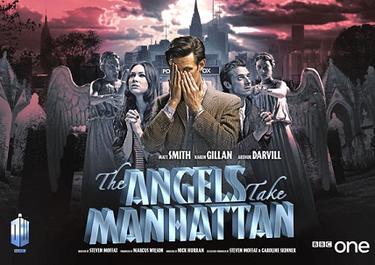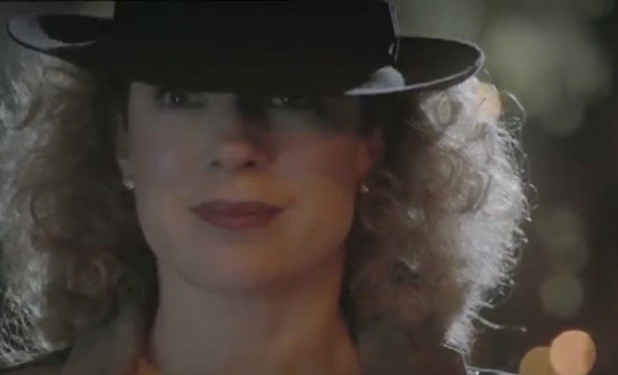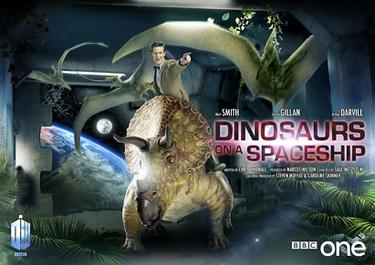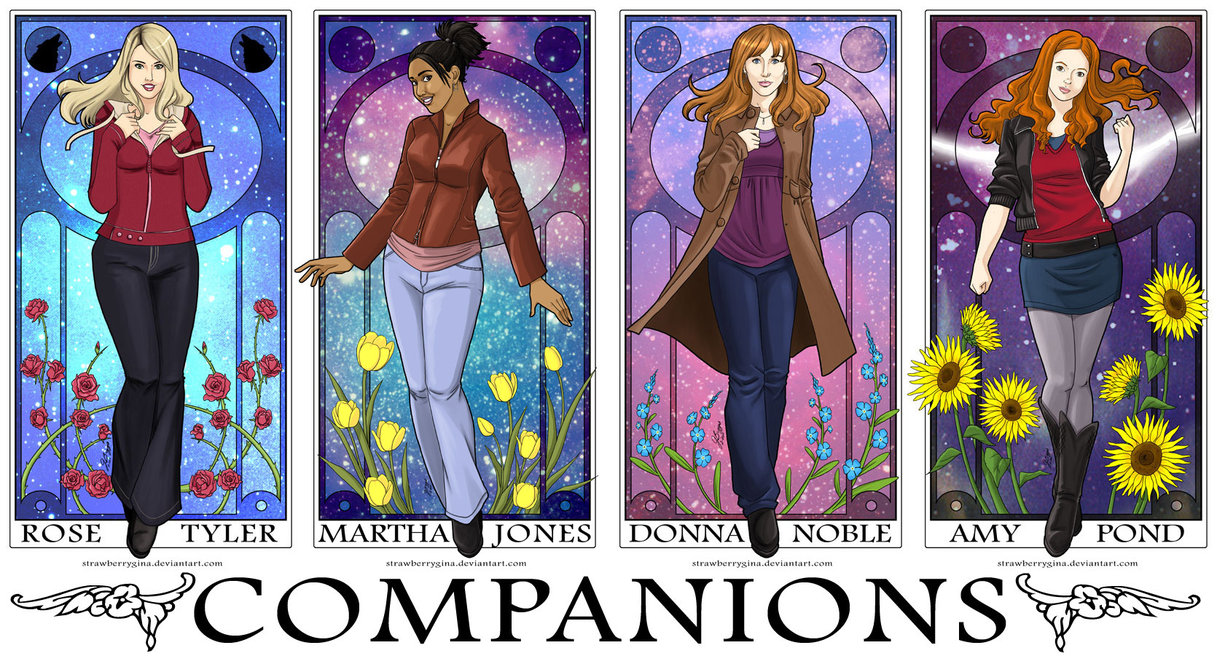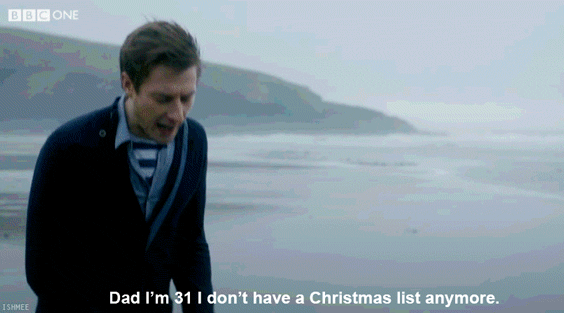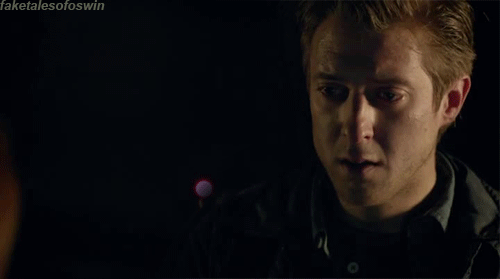STORY 233: THE ANGELS
TAKE MANHATTAN
Even before I saw The Angels Take Manhattan, I worried that this story simply had too much for its running time. You had the farewell of the WILLIAMSES, the return of the Weeping Angels, AND the reemergence of River Song, and all to be done within an hour. Would all that really build up to not just an emotionally impacting story but also a GOOD one? After having watched The Angels Take Manhattan, I can say it's strong on atmosphere, short on everything else.
We start with a voice-over (the third straight v.o. in Series/Season Seven after A Town Called Mercy and The Power of Three) where gumshoe Sam Garner (Rob David) is both typing out a Raymond Chandler-type story and investigating a case of 'statues that come to life'. We find that his investigation leads him to the Winter Quay (which appears to be a run-down hotel), where Garner makes a shocking discovery: he comes face to face with his older self, and the danger of The Weeping Angels.
We now switch to 2012 New York where the Doctor (Matt Smith), and his Companions Amy Pond (Karen Gillan) and Rory XYZ (Arthur Darvill) are enjoying a respite in Central Park. The Doctor in particular is thrilling to a pulpy crime novel with an extraordinary character: a woman described as having "ice in her heart, and a kiss on her lips and a vulnerable side she keeps well hidden" This character is the Ultimate Femme Fatale, and she's named Melody Malone.
It's at this point I must stop to ask, Is Steven Moffat DELIBERATELY trying to be obvious or does he really think we're all THAT stupid?
In any case, an innocent journey for Rory to get coffee end with a "shocking twist": he is transported to April 3, 1938, where our story-within-a-story, Melody Malone, takes place. We then get a spoiler...I mean, a surprise:
RIVER SONG IS BACK!!
And there was rejoicing throughout the land...hurray!!!
She greets "Dad" and we're whisked into the home of gangster Mr. Grayle (Mike McShane) who had hired Garner and now had hired River. She manages to break through the Time Barriers (or something) because A.) she's River Song, who can do anything, or B.) her Vortex Manipulator (a mini-version of the TARDIS) or C.) it is necessary for the plot? Take a guess.
Eventually the Doctor and Amy break on through to the other side but by now we know that Grayle has an injured Weeping Angel and River actually manages to be scared for once in her life when it grabs her wrist. We also know that Rory was dumped in the cellar where cherubim are taunting him.
Well, with Melody Malone as their guide, they just can't simply skip ahead but the Chapter Titles will give them clues. The chapter The Roman in the Cellar tells them where Rory is, but the next two chapters, Death at Winter Quay and Amelia's Last Farewell send the Doctor into a tormented fury. River does manage to break free of the Angel...and manages to break her wrist to do so.
This inability of River to change the future upsets the Doctor (must be seeing the hero of the show not being as good as the Doctor thought she was), but he cures her by giving up some of his regeneration energy. River promptly slaps him for being so sentimental.
No time for more 'banter' entre Mr. and Mrs. Song because we've tracked down Rory...at the Winter Quay. A rescue goes wrong when Rory and Amy encounter old Rory, who promptly dies.
AGAIN.
The Winter Quay is a farm where the Angels harvest their victims and live off them for decades, but if Rory manages to escape he can create a paradox that will destroy the hotel. How to do that? By jumping to his death of course. If he's dead when he's younger, maybe he won't die at the hotel of old age. Amy, making her choice, jumps with him. With that, Rory dies again.
AGAIN.
Well, we think that all's well and good, but in the cemetery they land in Rory notices a grave that has his name: Rory Arthur Williams (note that it doesn't say Rory Pond, thus invalidating the idea of "the Ponds"). Wouldn't you know it: one Angel survived, and it takes Rory out.
So Rory dies again, again.
AGAIN.
Amy will not let him go, but the Doctor can't do anything for Rory because the book has made things a fixed point in time, which cannot be changed. With that, Amy literally touches the Angel and she pops to her death.
The Doctor and River go off on the TARDIS: he devastated, she remarkably well considering she's just seen her parents die. Knowing that River wrote the book (oh God does that sound silly), and gives it to Amy to put in the Doctor's pocket in the future, the Doctor remembers he's taken out the last page (since he doesn't like endings). Here, in the afterword, along with River's instruction, he goes back to young Amelia Pond, to tell her all about their adventures together.
I think ATM proves one thing: Steven Moffat is by no means the genius he's been promoted to.
In fact, it shows that Moffat is determined to reshape River Song (formerly known as Doctor Who) into something that ignores all that has come before (even things from the Moffat reign).
ATM's biggest problem is River. Longtime readers know I detest River Song. They know I think she sucks...everything out of Doctor Who whenever she pops in with her inane "Spoilers" and "Hello, Sweetie". Her narcissism, her exaggerated sense of brilliance, her coldness, her attempts at wit, her ego with nothing to back it up...
I know now why she is the mirror image of Steven Moffat, but I digress.
...in short her entire existence in all her stories defies understanding. I have long argued that whenever River appears, she becomes the focus of the story, so much so that everything starts revolving around her (and by consequence, reducing the Doctor to a supporting character on his own show). In The Angels Take Manhattan, we see this River Complex come again.
WHY is River in this story at all? Moffat is cheating by starting out with a male voice-over typing out Chapter One: The Dying Detective. If he had been honest, it would have been River's voice reading us the story. Moreover, the idea of her writing this story smacks of self-serving aggrandisement.
If she is writing Melody Malone (or if "Melody Malone" is her pseudonym, and a shockingly obvious one at that), then as the author she should know how the story ends. After all, SHE wrote it. That being the case, one wonders why her fixation not to give "spoilers" doesn't make the Doctor question how he could "love/be in love", let alone "marry" someone who apparently has no problem seeing her parent die.
Going on further into how River destroyed ATM, when we first see her, she greets Rory with "Hello, Dad," but is never troubled by the fact that her father is being put in great danger. That's because she is too busy behaving like this alluring femme fatale she believes herself to be to notice anything else. One might have thought that Moffat or director Nick Hurran might have at one point stopped to say, "this is her father, someone she's met and known, so couldn't you drop the whole 'woman of mystery' act at least for a few moments to appear at least slightly human".
This wasn't the route they went for. Instead, Moffat wrote and Hurran directed Kingston to amp the vamp to almost comic proportions, making the proceedings almost a spoof of hard-boiled film noir stories.
River as a character is never realistic. She's far too clever. We've already covered how in previous River-centric stories she could operate the TARDIS better than the Doctor, how she knows more than The Doctor, how the Doctor is wildly in love with her, but now she comes across as far too fearless, keeping up what she imagines to be witty sexually-tinged banter with Grayle and the Doctor, never showing any fear towards Weeping Angels.
It isn't until it takes her wrist that River finally shows genuine fear, which leads one to wonder if her whole appearance prior to that moment was all an act or if she genuinely behaves in this nutty way, strutting around trying to be oh-so-witty. If Moffat had ever decided to tone down River's perceived perfection, we might have had a character. As it stands, River is a caricature, and a bad one at that.
It never fails to amaze me how egotistic she is. At one point she tells Rory that the Doctor couldn't get through the time barrier. “You didn’t come here in the TARDIS. Too many time distortions. It would be like landing a plane in a blizzard. Even I couldn’t do it.”
That one line captures all that's wrong with River Song. She has just declared (yet again) that she is smarter and better than the title character. How can one love or care about a character so self-absorbed, so arrogant in her self-proclaimed genius? But enough about Steven Moffat...
River Song spent so much time being "alluring", being "brilliant", being "the object of desire to all men", that she never learned to be "human". One looks at all previous Companions, and we see that the best ones (Jo, Sarah Jane, Ace, Rose) were far from perfect. They weren't subservient to the Doctor, but they still knew they had much to learn. One can say that Romana started out as highly confident in her intellectual superiority to the Doctor, but over time we saw that she was just merely book-smart, not street-smart, and still needed much to learn.
River Song on the other hand, from the word "go" was presented as this brilliant being who knew more and was sexier than anyone else in past/present/future: Albert Einstein and Marilyn Monroe put together. However, her rampaging ego always marks her down as what she really is: a poser, a self-absorbed psychopath who has no soul. How else to explain her apparent lack of interest that her parents were killed in a book she wrote?
I figure we have other things to cover, but one more point about River Song in ATM. Why was she here? Answered questions have never been Moffat's strong suit. How did she come to investigate the goings-on in 1930s New York? Why throw in the detective if we're just going to move on to River being the storyteller?
Now, as time goes by (no pun intended) ATM suffers from more really strange loops. Let's go with the ending and say that the Doctor really did come back to Amelia after she had waited all night for him to return. If so, then doesn't that really invalidate all of Series/Season Five from The Eleventh Hour onwards? After all, it was Amy's anger at being kept waiting and of the Doctor showing up twelve years later that propelled that story along with all of the Amy/Doctor stories.
She was billed as The Girl Who Waited, but if as we now see at the end of ATM Amelia really didn't wait because the Doctor told her everything that happened to her in the future. With that being the case, then when he does appear to her in TEH she really has no reason to be upset because she's been told everything (or at least was sent to bed that morning) and thus the entire "girl who waited" business has been just a two-year waste of our time.
Still, let's move on to some positives. Hurran and Moffat did get one thing right: ATM certainly has a lot of style. The sets and cinematography all evoke the film noir style they were aiming for (even if it didn't quite gel within the story itself). Moffat got the gumshoe detective right with the vocal inflections and clothes, so that's a plus.
However, I'm going to slip back into the bad because The Angels Take Manhattan is eerily similar to a much-praised British miniseries called The Singing Detective. Dennis Potter's story is also about a person who is "writing a Raymond Chandler-esque mystery" while also going into the story itself. Isn't that what we have with The Angels Take Manhattan?
In both The Angels Take Manhattan and The Singing Detective, you have someone writing a noir detective story but also finding themselves as characters within the story they are writing. This came to me when I saw the title of the first chapter typed out. Granted, it was The Dying Detective rather than The Singing Detective, but when I remembered that the author of the fake novel "The Singing Detective" was dying in the story, the words 'singing' and 'dying' collided within my memory to flash back to Potter's work.
A big problem with ATM is Moffat's heavy-handed way with characters and foreshadowing. When the Doctor tells Amy, "I don't like endings," we could see the 'symbolism' behind that line from outer space. Nothing is more irritating than a writer being overt. One line that stuck out was when Amy asks the Doctor what's going on. His answer, "I don't know. We're in New York."
What does that MEAN? It doesn't make any sense. Does it mean that things in NYC are unexplainable? It's a strange line.
And really, another, "Doctor Who?" line?! That lost its cleverness eons ago, but there it is again: someone has to ask, "Doctor Who?". I hate that, I really do.
"When one's in love with an ageless god, who insists on the face of a 12 year old, one does one's best to hide the damage." That sound lovely, but the Doctor isn't ageless and unless either River had a heart-to-heart with either Amy or the Doctor she wouldn't be privy to such things...unless she looked into their files. Furthermore, is it me or does it make the Doctor sound a bit like a pedophile? Why CAN'T he see the damage? He's seen several Companions damaged (Ace wasn't exactly without mommie issues, you know...oh that's right, you don't), so seeing River with a broken arm is really going to shatter him that much (no pun intended)?
Finally, with the end of the "Ponds", we will alas bid farewell to the Official Rory Williams Death Count. Despite the number of times Rory has died on Doctor Who, ATM took the cake. I wonder if Moffat decided that since Rory dying had now become a hopeless joke (the emotional equivalent of 'the sonic screwdriver can fix everything'), he decided to go whole-hog and kill Rory off THREE TIMES.
Note: we have a character die THREE TIMES IN ONE HOUR!
Does anyone else think this isn't just gone past a joke to being downright insane?
THREE TIMES. Count them.
Death Number One: at the Winter Quay, of old age.
Death Number Two: at the rooftop of the Winter Quay, by jumping off said roof.
Death Number Three: at the cemetery, literally by being touched by a Weeping Angel.
Again, there was a lot thrown into The Angels Take Manhattan. I have to give credit where it's due: Darvill and Gillan gave strong performances of people who will die together. The sets, costumes, and cinematography were evocative of the era.
However, River kills this story: her appearance is irrelevant/superfluous/unnecessary. A great many plot holes are left unanswered (why can the Angels look at each other now? how can the Doctor control his regenerative energy? why waste it on River when one figures a simple brace will do? why is the Doctor so passionate about a woman who appears to do nothing but show him up and who really is all wrong for him?). Also, Rory's Triple-Death...so wrong. It was as I feared: simply too much for the weight it tried to carry.
For a farewell episode, The Angels Take Manhattan is a terrible let-down.
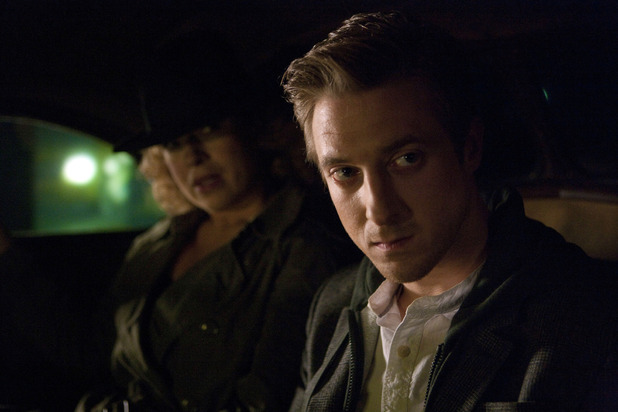 |
| Rory Williams Death Count |
In Episode: THREE
Overall: 7.2
3/10
Next Story: The Snowmen
